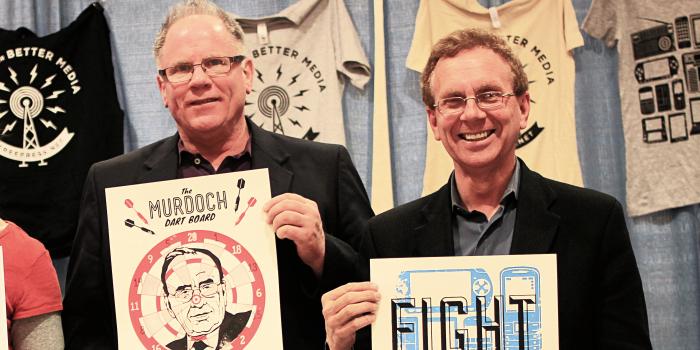Free Press Files Petition to Deny T-Mobile/Sprint Merger

WASHINGTON — On Monday, Free Press filed a petition to deny the proposed $26.5 billion merger between T-Mobile and Sprint. In its filing with the Federal Communications Commission, Free Press explains that the companies have failed to demonstrate that the merger would serve the public interest, increase competition or meet antitrust standards enforced by the U.S. Department of Justice.
This deal’s harms to competition would be most acutely felt by subscribers who rely on lower-priced wireless options, Free Press wrote in its petition (available here), adding that people of color are heavily represented in that demographic.
A relatively higher degree of competition in the wireless marketplace has helped create more good options for wireless users, as well as more robust mobile broadband markets for resellers, which have driven prices lower for people in these communities. This merger would diminish that competition and reverse many of the consumer benefits that resulted from the U.S. Government’s 2011 rejection of the proposed AT&T/T-Mobile merger.
As competitors against one another and providers of wholesale services to resellers, T-Mobile and Sprint have helped bring affordable access to the most price-sensitive customers. Free Press argues that allowing the merger to go through would amplify the harms to these low-income users, and to people of color who rely on the two competing carriers — either directly or through their resellers and prepaid services — in disproportionate numbers.
According to a recent survey from S&P Global Market Intelligence, 56 percent of T-Mobile's customers are people of color, as are 45 percent of Sprint's customers. (That number is even higher for some of these carriers' prepaid brands: 62 percent of MetroPCS customers and 57 percent of Boost customers are people of color.)
Free Press Research Director S. Derek Turner made the following statement:
“The elimination of what little wireless competition currently exists in the U.S. marketplace absolutely would not serve the public interest. People in the United States need real choices, and the affordable services that result from them. They also need advanced wireless services on par with what’s available elsewhere in the world.
“They don’t need to trade the few affordable options they have in the marketplace for fanciful promises from company executives about better technology, increased choices and lower prices. Like dealmaking CEOs before them, T-Mobile’s John Legere and Sprint’s Marcelo Claure have explicitly promised to deliver these benefits to everyone. Such spin may play well on CNBC. It doesn’t hold up to real analysis of the marketplace or to the history of past mergers of this sort.
“The claimed efficiencies of this merger are wildly overstated and speculative at best. Even if they were real, they would not depend on getting this merger done, as both companies have explained time and again that they were already building their own 5G networks before they dreamed up this deal. And even then, these supposed benefits would not outweigh the adverse competitive impacts of and permanent harms from contracting the wireless market to three dominant carriers.
“There’s much more to say about why this deal is such a bad one for internet users and families who are already struggling to stay connected. But it’s clear at the outset that the pro-merger propaganda and little magenta lies we’re hearing from T-Mobile and Sprint are a lot like the rhetoric we’ve heard in deals past. It was wrong then, and it's really wrong now.”




